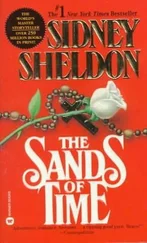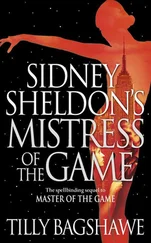“It’s about Mr. Burke’s bill…” Judd began.
“His bill?” She made no effort to conceal her disappointment.
Judd went on quickly. “My receptionist is—is no longer with me, and I’m trying to straighten out the books. I see that she charged Mr. Burke for a nine-thirty appointment this past Monday, and I wonder if you’d mind checking his calendar for that morning?”
“Just a moment,” she said. There was disapproval in her voice now. He could read her mind. Her employer was cracking up and his analyst was only concerned about getting his money. She came back on the phone a few minutes later. “I’m afraid your receptionist made a mistake, Dr. Stevens,” she said tartly. “Mr. Burke couldn’t have been at your office Monday morning.”
“Are you sure?” persisted Judd. “It’s down in her book—nine-thirty to—”
“I don’t care what’s down in her book, Doctor.” She was angry now, upset by his callousness. “Mr. Burke was in a staff meeting all morning on Monday. It began at eight o’clock.”
“Couldn’t he have slipped out for an hour?”
“No, Doctor,” she said. “Mr. Burke never leaves his office during the day.” There was an accusation in her voice. Can’t you see that he’s ill? What are you doing to help him?
“Shall I tell him you called?”
“That won’t be necessary,” Judd said. “Thank you.” He wanted to add a word of reassurance, of comfort, but there was nothing he could say. He hung up.
So that was that. He had struck out. If neither Ziffren nor Harrison Burke had tried to kill him—then there could be no one else with any motive. He was back where he had started. Some person—or persons—had murdered his receptionist and one of his patients. The hit-and-run incident could have been deliberate or accidental. At the time it happened, it seemed to be deliberate. But looking at it dispassionately, Judd admitted to himself that he had been wrought up by the events of the last few days. In his highly emotional state he could easily have turned an accident into something sinister. The simple truth was that there was no one who could have any possible motive for killing him. He had an excellent relationship with all his patients, warm relationships with his friends. He had never, to his knowledge, harmed anyone. The phone rang. He recognized Anne’s low, throaty voice instantly.
“Are you busy?”
“No. I can talk.”
There was concern in her voice. “I read that you were hit by a car. I wanted to call you sooner, but I didn’t know where to reach you.”
He made his voice light. “It was nothing serious. It will teach me not to jaywalk.”
“The papers said it was a hit-and-run accident.”
“Yes.”
“Did they find the person who did it?”
“No. It was probably some kid out for a lark.” In a black limousine without lights.
“Are you sure?” asked Anne.
The question caught him by surprise. “What do you mean?”
“I don’t really know.” Her voice was uncertain. “It’s just that—Carol was murdered. And now—this.”
So she had put it together, too.
“It—it almost sounds as if there’s a maniac running around loose.”
“If there is,” Judd assured her, “the police will catch him.”
“Are you in any danger?”
His heart warmed. “Of course not.” There was an awkward silence. There was so much he wanted to say, but he couldn’t. He must not mistake a friendly phone call for anything more than the natural concern that a patient would have for her doctor. Anne was the type who would have called anyone who was in trouble. It meant no more than that.
“I’ll still see you on Friday?” he asked.
“Yes.” There was an odd note in her voice. Was she going to change her mind?
“It’s a date,” he said quickly. But of course it was not a date. It was a business appointment.
“Yes. Good-bye, Dr. Stevens.”
“Good-bye, Mrs. Blake. Thanks for calling. Thanks very much.” He hung up. And thought about Anne. And wondered if her husband had any idea what an incredibly lucky man he was.
What was her husband like? In the little Anne had said about him, Judd had formed the image of an attractive and thoughtful man. He was a sportsman, bright, was a successful businessman, donated money to the arts. He sounded like the kind of person Judd would have liked for a friend. Under different circumstances.
What could Anne’s problem have been that she was afraid to discuss with her husband? Or her analyst? With a person of Anne’s character, it was probably an overwhelming feeling of guilt because of an affair she had had either before she was married or after her marriage. He could not imagine her having casual affairs. Perhaps she would tell him on Friday. When he saw her for the last time.
The rest of the afternoon went by swiftly. Judd saw the few patients he had not been able to cancel. When the last one had departed, he took out the tape of Harrison Burke’s last session and played it, making occasional notes as he listened.
When he had finished, he switched the tape recorder off. There was no choice. He had to call Burke’s employer in the morning and inform him of Burke’s condition. He glanced out the window and was surprised to see that night had fallen. It was almost eight o’clock. Now that he had finished concentrating on his work, he suddenly felt stiff and tired. His ribs were sore and his arm had begun to throb. He would go home and soak in a nice hot bath.
He put away all the tapes except Burke’s, which he locked in a drawer of a side table. He would turn it over to a court-appointed psychiatrist. He put on his overcoat and was half way out the door when the phone rang. He went to the phone and picked it up. “Dr. Stevens.”
There was no answer on the other end. He heard breathing, heavy and nasal.
“Hello?”
There was no response. Judd hung up. He stood there a moment, frowning. Wrong number, he decided. He turned out the office lights, locked the doors, and moved toward the bank of elevators. All the tenants were long since gone. It was too early for the night shift of maintenance workers, and except for Bigelow, the watchman, the building was deserted.
Judd walked over to the elevator and pressed the call button. The signal indicator did not move. He pressed the button again. Nothing happened.
And at that moment all the lights in the corridor blacked out.
Chapter Seven
JUDD STOOD IN FRONT of the elevator, the wave of darkness lapping at him like a physical force. He could feel his heart slow and then begin to beat faster. A sudden, atavistic fear flooded his body, and he reached in his pockets for a book of matches. He had left them in the office. Perhaps the lights were working on the floors below. Moving slowly and cautiously, he groped his way toward the door that led to the stairwell. He pushed the door open. The stairwell was in darkness. Carefully holding onto the railing, he started down into the blackness. In the distance below, he saw the wavering beam of a flashlight moving up the stairs. He was filled with sudden relief. Bigelow, the watchman. “Bigelow!” he yelled. “Bigelow! It’s Dr. Stevens!” His voice bounced against the stone walls, echoing eerily through the stairwell. The figure holding the flashlight kept climbing silently, inexorably upward. “Who’s there?” Judd demanded. The only answer was the echo of his words.
And Judd suddenly knew who was there. His assassins. There had to be at least two of them. One had cut off the power in the basement while the other blocked the stairs to prevent his escape.
The beam of the flashlight was coming closer, only two or three floors below now, climbing rapidly. Judd’s body went cold with fear. His heart began to pound like a trip-hammer, and his legs felt weak. He turned quickly and went back up the stairs to his floor. He opened the door and stood, listening. What if someone were waiting up here in the dark corridor for him?
Читать дальше











